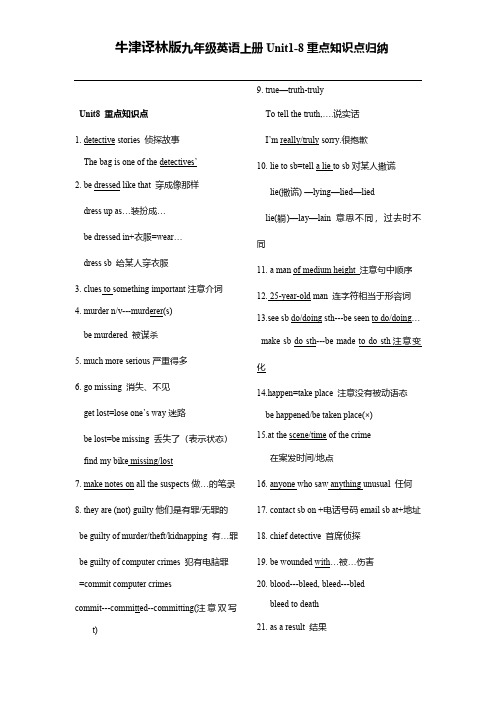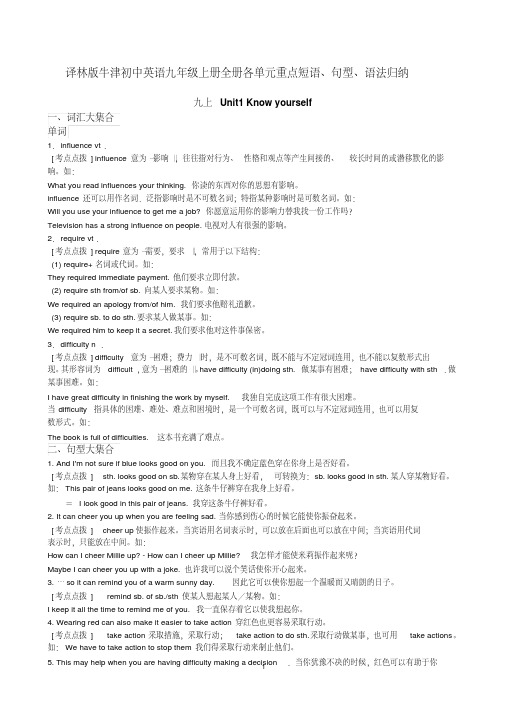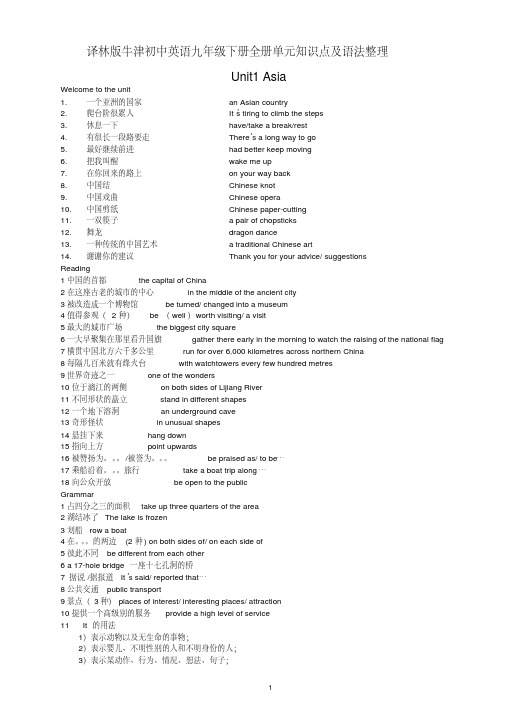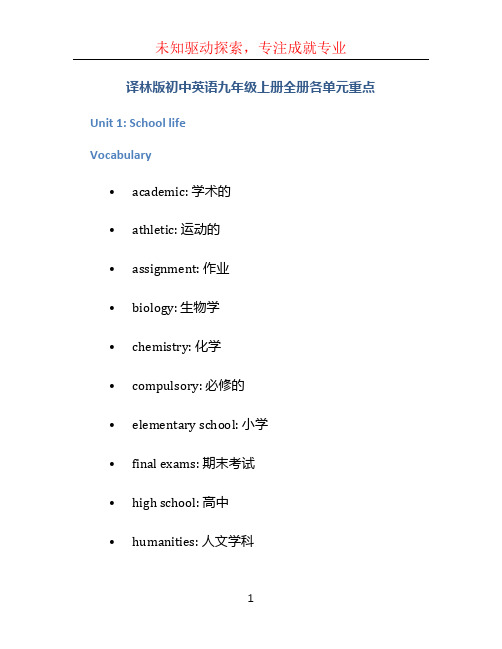牛津译林版初中英语九年级上下册全册知识点归纳总结【推荐】
牛津译林版九年级英语上册Unit1-8重点知识点归纳

Unit8 重点知识点1. detective stories 侦探故事The bag is one of the detectives’2. be dressed like that 穿成像那样dress up as…装扮成…be dressed in+衣服=wear…dress sb 给某人穿衣服3. clues to something important注意介词4. murder n/v---murderer(s)be murdered 被谋杀5. much more serious严重得多6. go missing 消失、不见get lost=lose one’s way迷路be lost=be missing 丢失了(表示状态)find my bike missing/lost7. make notes on all the suspects做…的笔录8. they are (not) guilty他们是有罪/无罪的be guilty of murder/theft/kidnapping 有…罪be guilty of computer crimes 犯有电脑罪=commit computer crimescommit---committed--committing(注意双写t)9. true—truth-trulyTo tell the truth,….说实话I’m really/truly sorry.很抱歉10. lie to sb=tell a lie to sb对某人撒谎lie(撒谎) —lying—lied—liedlie(躺)—lay—lain 意思不同,过去时不同11. a man of medium height 注意句中顺序12. 25-year-old man 连字符相当于形容词13.see sb do/doing sth---be seen to do/doing…make sb do sth---be made to do sth注意变化14.happen=take place 注意没有被动语态be happened/be taken place(×)15.at the scene/time of the crime在案发时间/地点16. anyone who saw anything unusual 任何17. contact sb on +电话号码email sb at+地址18. chief detective 首席侦探19. be wounded with…被…伤害20. blood---bleed, bleed---bledbleed to death21. as a result 结果as a result of…因为…的结果22. check the scene for more clues/fingerprints23. solve the case/crime 破案24. be single 单身的25. according to…根据…26. be charged with doing sthbe charged with theft/murder/kidnapping 27. break into 强行闯入break down损坏break out爆发break up打碎break off中断28. make sb some enemies使某人树敌29. be supposed to do sth=should do sth30. breath---breatheout of breath---breathe heavily31. offer a reword of…提供….钱的奖金32. lead to the arrest of the murdererlead—led---ledbe arrested for=be under arrest for因…被捕33. the elderly couple 看作复数形式34. have something/nothing to do with和….有/没关系35. probably 可能(放句中,修饰动词)maybe放在句子开头,修饰整个句子perhaps放句首或句末,修饰整个句子36. a master at solving cases破案方面的大师37. consider doing sth 考虑做某事consider sb+形---be considered+形consider sb as/to be---be considered as/to be 38. report sth to sb 报告某事给某人It is said/reported that…据说/报道…39. it turns/turned out that…结果是…原来是40. be in a hurry to do sth=hurry to do sthWhy are you in such a hurry?41. sometime 某一时间some time 一段时间42. kidnap-kidnapping-kidnapperbe kidnapped43. be in prison for six months=spend six months in prison44. have no criminal record 没有犯罪记录crime—criminal(犯罪的、罪犯)45. safe—safely—safetysafety tips安全建议arrive safely46.protect yourselves against crime保护你自己免受犯罪伤害47. shut –shut—shut 过去时过去分词不变48. guard against any possible danger aroundus 提防我们身边任何可能的危险49. get along/on with sb 和某人相处融洽50. do sth for a living 做某事谋生51. steal—stole—stolen52. right after就在…之后53. 定语从句的用法:(1)修饰人:who/that修饰物:which/that(2)关系代词做主语不能省略,宾语可省略(3)疑问句中,有了疑问词,关系代词不能再用which/who,用that(4)关系代词做宾语,修饰人也可用whom(5)如果人和物之间是从属关系,用whose(6)先行词前有something/anything/nothing序数词、最高级、some/any/all, theonly, the very, the last等词时只能用that(7) 定语从句中介词提前时,介词后只用which/whom,不能用who和thatUnit71.in your dreams 你做梦2.so…that---such thatso+形容词/副词so kind/carefullysuch+(a/an)+形容词+名词such a good boy---such good weather特例:如此多/少的东西,必须用soso many/few boys, so much/little milk注意:such little babies(注意little的意思)3. do sth instead---do sth instead of doing sth4. be suitable for entering the film industrybe suitable for doing sth/to do sthenter=come into, enter不能加into5. the film industry电影业agriculture and industry农业和工业(不可数)different industries不同的产业(可数)6. would rather do sth than do sthprefer to do sth 更喜欢做某事7. all-time greatest actresses空前最好的演员8. die-dead-death, be found deadthe death of sb= sb’s death9. lose—lost—lossthe loss of …失去…10. beauty—beautiful---beautifullysb’s beauty=the beauty of sb11. dream of doing sth梦想做某事12.work as a model 从事…工作13. while/before/after doing sthWhile sb+现在进行时或过去进行时14. catch one’s attention吸引某人注意力15. insist that+句子./insist on sth/doing sth16. play the (lead) role of…扮演…的(主)角play some major roles扮演一些主要的角色17. be based on以…为基础This film is based on a novelI like the film based on this novel(定语)18. mark the beginning of her successfulcareer标志她成功事业的开端19. choose sb to do..---be chosen to do sth20. be a big success=be very successful21. win an Oscar for best actress for her role22. four more=another four又四个23. make one’s final appearance24. go beyond the film industry 超越People over/under 18超过…年龄above/below 0°c 超过…温度beyond my ability/duty/12 o’clock/midnight 25. in 1950, in the 1950s区分两个短语26. so that+句子(以便,表目的)=to/in order to do sth27. work closely with…和…密切合作28. because of her efforts in this area努力29. discover发现以前未被发现的事物find找到…或者偶然发现…find out 查明、弄清楚30. have cancer得了癌症31.pass away (die)peacefully安宁去世32. attract-attractive, attract sblook attractive, attractive quality33. though/although 不能和but同时使用because 和so不能同时使用34. avoid the rush hour避免交通高峰期35. only have a T-shirt on 只穿一件体桖36. read through sth通读、仔细阅读37. mistake—mistook—mistakenmistake sb for…误认为某人是…38. attend a course/meeting/wedding参加…39. be suitable for all ages 适合所有的年龄40. fall in love with sb 爱上某人41. be on在放映42.bring dinosaurs alive on screen把恐龙活生生带到屏幕上43. there is a special offer特价44. be cancelled(注意双写)被取消45. so+动词+主语某某人也一样neither动词+主语某某人也不是so+ 主语+动词是的,的确是的Jim is a student, so am I 我也是Jim likes music, so does Tom Tom也是Jim won’t play football, neither will IJim didn’t sleep last night, neither did Lily尤其注意前后动词要一致---Jim is a good student,--- so he is的确是的---It is fine today ---so it is 的确是的46. be full of=be filled with充满47. date/place of birth 出生日期/时间48. join humour and exciting action together49.set up 建立50. far more than that 远远不止哪些51. be considered as/to be…被认为是….52. efforts in charity work慈善方面的努力Unit6 1. get bored with doing sth厌烦做某事2. a dog’s work is never done 演员做不完3. types of TV programmes 电视节目的类型4. real-life events 真实生活的事件5. there is sb doing sth 有某人在做某事6. a weekly round-up 每周的新闻摘要7. a lastest magazine 注意冠词和拼写an up-to-date magazine8. cover different sports 报道cover报道、覆盖、封面9. the number of…is…a number of+可数名词…are…a great deal of+不可数名词…is…10. interview sb (动词)采访某人have an interview with sbthere are a number of interviews with sbe-coming,include-including(逗号隔开)12. be covered live 被现场直播My grandfather is still alive活着的lively(活泼的)---lovely(可爱的)13. Asia—Asian(亚洲的)---Asian(s)亚洲人14.vote online for…在网上为…投票15.send text messages to…发送短信息到..16.win two free concert tickets单复数17. a horror film directed by…定语(被动)a boy playing football定语(主动)18. direct—director(s)19. be found dead , die—dead--death20.until直到,not until 直到…才(区分句意)21. scare—scared, get scared easily22. take a close look at…近距离的观察23. see scenes from India风景(一般用复数)24. win an award for its amazing photography25. if如果(主将从现)分清主句和从句If your homework is finished, you can leave If/whether是否,时态看具体时间whether…or…(后面有or只能用whether)26. unless(if…not…) 除非---主将从现规则27. have a chance to do sth 有机会做某事28. have little interest in…对…有很少的兴趣29. TV viewing habits 看电视的习惯30. be a waste of time 浪费时间31. receive a message from….32. be pushed into…被推进33. three man in police uniformsUnit51. something pleasantI am pleased with this trip.This trip is pleasant/unpleasant2. music—musical—musicianmusical talent ----musical instrumentsone of the greatest musicians.3. present sb with sth---present sth to sb provide sb with sth---provide sth for sb4. win—winner(s)—won--won5. show an interest in=be interested in...6. the sounds of rushing water and blowingwind7. make music with common objects8. go on to do sth继续做不同的事情go on doing sth 继续做同一件事情9. get to know great musicians开始认识…get sb to do sth使某人做某事10. be known/famous for…因…而出名be known/famous as…作为…而出名11. win an Oscar for best actress for her role12.by controlling the speed of water flowby doing sth 通过做某事through the internet通过网络13.build a bridge between the East and theWest14.bring Chinese and Western music together15. tradition---traditionaltraditional Chinese music16. in a western style用西方的风格17. dream without boundaries梦想无边18. divide—dividing ---dividing line划分线19. because与so,though与but不同时使用20.think/speak highly of…高度赞扬high---highly--height21. be open to…对…开放22. in twenty minutes---in+时间用将来时23. run towards sb朝某人跑去24. breath---breathe---breathe heavilyout of breath, take a deep breath25. hurry into…匆忙进入…hurry to do sth=be in a hurry to do sth 26. last for…持续…(延续性动词)last---lasting---have a lasting value27.make up music while playing创作28. has strong local color有强烈的地方特色29. praise sb for sth因为某事表扬某人30.have a (real) gift for…有…的天赋31. drop---dropping---droppedblow---blew---blown32. run in all directions 向四面八方跑33. encourage sb (not) to do sth34. enjoy oneself in the world of…沉醉于…的世界里Unit11.eat---ate---eaten ---eat up吃光Set up建立use up用光grow up长大put up举手,张贴pick up捡起、接2. create-creative, energy—energetic organize—organized, patient—impatient--impatience注意词性变化3. keep sth in good order使…尽然有序4. show off 炫耀5. think of=come up with相出What do you think of…?=How do you like…?你认为…怎么样?6. be curious about….对…感到好奇7. neither…nor两者都不---就近原则either…or或者..或者---就近原则not only…but also 不仅…而且…--就近原则both…and两者都---主语看作复数形式all三者或以上都none三者或以上都不either两者中任意一个8. a born artist一个天生的艺术家9. impress sb with sth用…给某人留下印象10.win high praise from…赢得来自…的赞扬11.life is like a race, you either take the lead of fall behind逆水行舟不进则退12. a miss is as good as a mile失之毫厘,缪以千里as good as 和…一样13. pay attention to doing sth注意做某事Pay no attention to…不要理会…14. work to high standards工作高标准15. can’t be too careful再仔细也不为过16.care---careful---carefullycareless---carelessly---carelessness17.devote time to doing sth奉献时间做某事18. be suitable for being an artist动词不要漏19. that’s not the case事实并非如此20. be afraid of making a speechbe afraid of doing sth21. be absent from school缺课22. recommend sb as/to be 推荐某人做…23. general manager 总经理24. connect …to/with和…相连接A railway connecting A to B(定语,主动ing)25. think twice三思而后行26.do the dishes 洗碗27. appear in a fixed order以固定的顺序出现28. divide …into…----be divided into划分29. agree with sb 同意某人Unit21. look good on sb---look good in sth2. influence our moods影响我们的心情3.sleep—sleepy---asleep区分习性和意思4. sad—sadly—sadness5. prefer doing sth to doing sth=would rather do sth than do sth不加名词prefer sth to sth可以加名词prefer to do sth6. cheer you up使你振作开心7. remind sb of sth提醒某人某事remind sb to sth 提醒某人做某事8. strong---strength9. have difficulty (in) doing sth10. decide---decision---make a decision11. 宾语从句连接词:肯动动词后(know, think, believe, be sure等)用连接词that在疑问代词后(wonder, doubt, can you tell me…?, be not sure, not know)后面用if,Whether或者特殊疑问词语序:在宾语从句中用陈述句语序疑问词+主语+动词I wonder where he is from/what he likes What’s wrong/the matter?本身就是陈述句语序,不需要再改语序时态:主句是一般现在时,从句可以用任何时态,但不能用过去完成时和过去将来时I know Jim watched TV last night主句是过去时,从句必须用过去的相应时态Tom told me Lucy was swimming then.Tom told me if he had time, he would go there 但注意分析主句时态:I have been told that……He is often told…..It is said that….看准关键词注意:考察宾语从句时,有时还考察一些其他知识点,例如延续性动词,词组搭配等12. promise sb (not) to do sth 答应做某事13.stree—stressed, feel stressed14. advice—advise, suggest—suggestion(s)advise sb to do sthsuggest doing sth---suggest sth to sbUnit31. stomach---stomachs2. be on开着(状态)turn on打开3. of one’s age 和某人一样大4. manage your time better更好的管理时间5. how to deal with---what to do with….6. have no choice but to sthchoose-choice(可数)7. stay up late熬夜stay out late呆在外面很晚8. be worth doing sth没有被动语态9. allow sb to do sth10. be strict with sb in sth对某人某方面严格11. achieve a balance between…and…12. value---valuablebe of great value=be very valuablebe of some help=be very helpful13. make a list of…列一个清单…14. my advice is worth taking值得采纳15.silent---silencekeep silent---break the silence 打破沉默16. 提建议:why not/why don’t you do sth?had better so/not do sth…. 17. be proud of…以…为骄傲be proud to sth18. go over复习19. as…as possible=as …as sb canI will get up as early as possible=I will get up as early as I can20. pronounce---pronunciation21. keep sth to oneself把某事放在某人心里Unit41. on one’s mind 在某人的心上2. courage---encourage3. try out for…参与…的选拔4. refuse to do sth拒绝做某事5. lose heart 失去信心6. get sb to do sth 使某人做某事7. succeed in doing sth =so sth successfully 注意过去时拼写succeededbe a big success=be very successful8. take notice of sb注意到某人9. when to do sth什么时候做某事When/while doing sth当做某事的时候前后都是进行时,用while10. since既然,由于wherever无论哪里whenever无论何时whoever无论谁as soon as一…就…(过去时、主将从现)11. go into hiding躲藏12. die of死于内因die from死于外因13. have sb do sth ---have sth done14.in fear of one’s life担心某人的生命15.in one’s fifties/forties五十几、四十几岁16. to sb’s surprise/sadness/joy 令某人…。
牛津译林版初中英语九年级上下册全册知识点归纳总结【推荐】

牛津译林版初中英语九年级上下册全册知识点归纳总结【推荐】牛津译林版初中英语九年级上册全册知识点归纳总结牛津初中英语9A_Unit1--Unit6知识点归纳牛津英语9A Unit 1一、重点词汇1.【小试牛刀】1. 十二点钟了,可他还是睡不着。
It was twelve o’clock, but he was still __________.2. 别弄醒这个孩子,他才睡着。
Don’t ___________ the boy. He fell asleep just now.二、语法点拨1. It is + adj + of sb. + (not) to do sth.It’s +adj.+of sb. to do sth.句型在英语中运用较为频繁,尤其在口语中。
该句型通常表示说话人对客观事件的惊讶、兴奋、懊悔、难过等感叹情绪,其实相当于感叹句。
如:It’s very kind of you to help me. 你能帮助我,真是太好了!该句型与how 引导的感叹句可以互换,故上句可以改为:How kind it is of you to help me ! 或How kind of you to help me !在口语中, it is经常被省略, 再如:It’s nice of you to say so.你这样说,真是太好了!可以省略为Nice of you to say so.当然此句改为You’re nice to say so.也可,意思不变。
有时也可用简缩句型It’s + adj.+ of sb. 或That’s + adj. + ofsb., 如:It’s wrong of you . 你错了!That’s lovely of her. 她多可爱呀!该句型中用作表语的形容词常见的有如下几类:(1) 表示聪明或愚蠢的形容词,有clever, wise, foolish, stupid, silly 等, 如:It’s silly of him to do such a thing. 他竟干出这样的事,真是愚蠢!(2) 表示正确或错误的形容词,有right, wrong, correct, incorrect 等, 如:It was right of her not to come here. 她没有来这儿,太对了!(3) 表示好坏等品性的形容词,此类词较多,有good, nice, kind, sweet, friendly, lovely等, 如:It’s friendly of you to come and see me. 你能来看我,真够朋友!(4) 表示褒义或贬义色彩的形容词,有brave, polite, careless, selfish等,如:It was brave of you to manage to do it. 你居然能做成这件事,真勇敢!【补充】of sb. 的句型通常都可转换为不定式作状语的句子。
牛津译林九年级上学期英语知识点汇总

新译林英语9A UNIT1-UNIT8 词组重点句型知识点归纳Unit 1 Know yourself 知识点汇总一、词组、短语归纳Welcome to the unit1.It says 上面写着,上面显示2.eat up 吃光,吃完(use up 用完,用尽)3.be well organized 很有条理的4.keep … in good order 使……保持井然有序(in order 按顺序)5.show off 炫耀 ,卖弄6.show sb around sp 带领某人参观某地7.show sb the way to 给某人指到某地的路8.show no interest in 对……毫不感兴趣9.repeat grammar rulers for us 为我们重复语法规则e up with = think of 想出,提出;11.be curious about 对…感到好奇12.get angry easily 容易生气13.make a good accountant 成为一名优秀的医生14.neither ……nor ……既不……也不……(就近原则)Neither he nor I am well educated.He didn’t come here yesterday , neither / nor did I. 他昨天没来这儿,我也是15.work without speaking all day long 整天工作不说话Reading16.be happy with = be satisfied with 对……感到满意17.a born artist 一个天生的艺术家18.impress the whole country with his creative work 他的富有创造力的作品给全国人民留下深刻的印象19.win high praise from the art community 赢得艺术团的高度赞扬20.praise sb for sth 因某事表扬某人21.give up 放弃(代词放中间)22.give up doing sth = stop doing sth 放弃做某事23.work for the sales department in a big company 在一家大公司的销售部工作24.day after day 日复一日25.the general manager 总经理26.either ……or ……要么…要么…,或者…或者…(就近原则)27.take the lead 处于领先地位,带头28.fall behind 落后 (fall in 生病)29.be ready to do 准备做某事30.take on new challenges 接受新的挑战31.the chief engineer 首席工程师32.connect……with/to ……把……和……连接起来33.be connected with 与……有联系34.a miss is as good as a mile 差之豪厘,谬以千里35.as good as 与……几乎一样,简直是36.can’t afford to do 负担得起(费用、损失、后果)多用于否定句和疑问句中37.make mistakes 犯错误38.pay attention to every detail 注意每个细节(to 为介词 + doingsth )39.work to high standards 工作高标准40.easy to work with 容易一起工作41.a pioneer heart surgeon 一位心脏外科手术的带头人42.can’t be too careful = can never be too careful 再怎么细心也不为过43.be willing to do sth 愿意做某事44.devote oneself/ one’s life / time to 把……奉献给……(to为介词,后接名词,代词,动名词)45.respect sb = have / show respect for sb 尊重,尊敬某人46.be suitable for 适合Grammar and Integrated Skills and Study Skills47.accept others’ advice 接受别人的建议48.think twice (about sth ) 三思而行49.be /get angry with sb 生某人的的气50.be /get angry at/ about sth 因某事而生气51.worry too much 担心太多52.be patient / impatient with 对……有/ 没有耐心53.both ……and ……连接两个主语时,谓语动词用复数形式54.not only ……but (also )……不但……而且……(就近原则)55.do the washes 洗碗,洗餐具56.animal signs 生肖57.appear in a fixed order 按照固定的顺序出现58.make his lesson lively and interesting 使他的课上得生动而有趣(lively活泼的,生气勃勃的指人或物)59.in all 总共,总计60.people born under the same star sign 出生在同一星座下的人们61.share similar personalities 具有相似的个性62.be similar to 与……相似63.be similar in 在某方面相似64.depend on 依靠65.lunar calendar 农历66.be divided into 被分成67.divide ……into ……把……分成……68.It’s you who shape your life and your future 你的生活和将来都掌握在你的手中(强调句型)Task69.It’s said that 据说70.make a speech = give a speech 作演讲71.do extra work 做额外的工作72.win several science competitions 赢得几项科学竞赛73.get himself more organized 使他自己更加有条理74.be absent from school 缺席75.recommend sb as…推荐某人为/当…76.recommend sb for…推荐某人获…奖77.agree with sb 同意某人的看法、意见;适应(食物、气候)Useful sentences:78.It makes them feel good to share things with others.和别人分享让他们感觉很好。
译林版牛津初中英语九年级上册全册各单元重点短语、句型、语法归纳

译林版牛津初中英语九年级上册全册各单元重点短语、句型、语法归纳九上Unit1 Know yourself一、词汇大集合单词1.influence vt.[考点点拨] influence意为―影响‖,往往指对行为、性格和观点等产生间接的、较长时间的或潜移默化的影响。
如:What you read influences your thinking.你读的东西对你的思想有影响。
influence还可以用作名词.泛指影响时是不可数名词;特指某种影响时是可数名词。
如:Will you use your influence to get me a job?你愿意运用你的影响力替我找一份工作吗?Television has a strong influence on people.电视对人有很强的影响。
2.require vt.[考点点拨] require意为―需要,要求‖,常用于以下结构:(1) require+名词或代词。
如:They required immediate payment.他们要求立即付款。
(2) require sth from/of sb.向某人要求某物。
如:We required an apology from/of him.我们要求他赔礼道歉。
(3) require sb. to do sth.要求某人做某事。
如:We required him to keep it a secret.我们要求他对这件事保密。
3.difficulty n.[考点点拨] difficulty意为―困难;费力‖时,是不可数名词,既不能与不定冠词连用,也不能以复数形式出现。
其形容词为difficult,意为―困难的‖。
have difficulty (in)doing sth.做某事有困难;have difficulty with sth.做某事困难。
如:I have great difficulty in finishing the work by myself.我独自完成这项工作有很大困难。
九年级全册英语译林版重难知识点

九年级全册英语译林版重难知识点英语作为一门重要的国际语言,在我们的学习中起着关键的作用。
在初中九年级的英语学习中,译林版是常用的教材之一。
本文将介绍九年级全册英语译林版中的一些重难知识点,希望对同学们的学习有所帮助。
一、时态和语态时态是英语语法中非常重要的一部分。
译林版九年级英语教材中涉及到的时态有一般现在时、一般过去时、一般将来时等。
同学们需要熟练掌握这些时态的构成和用法,并能够在实际运用中准确地选择适当的时态。
语态是指动词形式中表明动作主语与动作对象的关系。
在译林版九年级英语教材中,常用到的语态有被动语态。
同学们需要了解被动语态的构成,掌握其在句子中的用法,并能够正确地转换主动语态和被动语态。
二、介词和连词介词和连词在英语中起到连接词组和句子的作用。
在译林版九年级英语教材中,同学们需要掌握一些常用的介词和连词,并能够在句子中正确使用。
常用的介词如in、on、at、by等,它们通常用来表达时间、地点、原因、方式等概念。
同学们需要根据具体的语境选择适当的介词。
常用的连词如but、and、or等,它们通常用来连接并列或对比的词组、短语或句子。
同学们需要注意连词的使用位置和连接的对象,避免出现语法错误。
三、词汇和短语词汇和短语是学习英语的基础,也是提高语言水平的关键。
在译林版九年级英语教材中,同学们需要掌握一些重要的词汇和短语。
同学们需要积累常见的动词、形容词、副词等,并能够灵活运用于句子中。
同时,需要掌握一些常用的短语,如keep up with、get along with、look forward to等,这些短语在口语和写作中经常出现。
四、语法点除了时态、语态等基本语法外,译林版九年级英语教材还涉及一些复杂的语法点,如虚拟语气、宾语从句、定语从句等。
同学们需要理解这些语法点的构成和用法,并能够正确地应用于实际语境中。
虚拟语气是英语中一个比较难点的语法,它通常用来表达不可能实现、假设或建议等概念。
译林版牛津初中英语九年级下册全册单元知识点及语法整理

译林版牛津初中英语九年级下册全册单元知识点及语法整理Unit1 AsiaWelcome to the unit1.一个亚洲的国家an Asian country2.爬台阶很累人It’s tiring to climb the steps3.休息一下have/take a break/rest4.有很长一段路要走There’s a long way to go5.最好继续前进had better keep moving6.把我叫醒wake me up7.在你回来的路上on your way back8.中国结Chinese knot9.中国戏曲Chinese opera10.中国剪纸Chinese paper-cutting11.一双筷子 a pair of chopsticks12.舞龙dragon dance13.一种传统的中国艺术 a traditional Chinese art14.谢谢你的建议Thank you for your advice/ suggestionsReading1中国的首都the capital of China2在这座古老的城市的中心in the middle of the ancient city3被改造成一个博物馆be turned/ changed into a museum4值得参观(2种)be (well)worth visiting/ a visit5最大的城市广场the biggest city square6一大早聚集在那里看升国旗gather there early in the morning to watch the raising of the national flag 7横贯中国北方六千多公里run for over 6,000 kilometres across northern China8每隔几百米就有烽火台with watchtowers every few hundred metres9世界奇迹之一one of the wonders10位于漓江的两侧on both sides of Lijiang River11不同形状的矗立stand in different shapes12一个地下溶洞an underground cave13奇形怪状in unusual shapes14悬挂下来hang down15指向上方point upwards16被赞扬为。
译林版初中英语九年级上册全册各单元重点

译林版初中英语九年级上册全册各单元重点Unit 1: School lifeVocabulary•academic: 学术的•athletic: 运动的•assignment: 作业•biology: 生物学•chemistry: 化学•compulsory: 必修的•elementary school: 小学•final exams: 期末考试•high school: 高中•humanities: 人文学科•literature: 文学•mathematics: 数学•physical education: 体育•physics: 物理•social studies: 社会学科•timetable: 时间表Grammar•Present Simple Tense: 现在简单时,用于描述经常性或反复发生的动作•Adverbs of frequency: 频度副词,用于描述动作发生的频率•Prepositions of time: 时间介词,用于描述动作发生的时间Communication Skills•Talking about school subjects and activities•Discussing dly routines•Describing likes and dislikes•Expressing frequency of actions Unit 2: FamilyVocabulary•adopt: 领养•biological: 生物的•elder: 年长的•extended family: 大家庭•generation: 一代•nuclear family: 核心家庭•orphanage: 孤儿院•relative: 亲戚•stepfather: 继父•stepmother: 继母•upbringing: 抚养Grammar•Past Simple Tense: 过去简单时,用于描述过去某个特定时间发生的动作•Prepositions of place: 地点介词,用于描述动作发生的地点Communication Skills•Talking about family members•Describing family relationships•Discussing family activities and events in the past•Sharing personal experiencesUnit 3: RecreationVocabulary•adventurous: 冒险的•campfire: 篝火•challenging: 具有挑战性的•destination: 目的地•equipment: 装备•hiking: 徒步旅行•kayaking: 划独木舟•personal interests: 个人兴趣•sightseeing: 观光•wildlife: 野生动物Grammar•Present Continuous Tense: 现在进行时,用于描述正在进行的动作•Prepositions of movement: 运动介词,用于描述特定运动的动作Communication Skills•Talking about recreational activities•Describing personal interests•Giving and understanding directions •Making plans for outings and trips Unit 4: TransportVocabulary•commute: 通勤•destination: 目的地•fare: 车费•journey: 旅程•pedestrian: 行人•route: 路线•rush hour: 高峰期•ticket inspector: 检票员•transport system: 交通系统•vehicle: 车辆Grammar•Present Continuous Tense: 现在进行时,用于描述即将发生或计划中的动作•Imperatives: 命令句,表示请求或建议的动作•Prepositions of direction: 方向介词,用于描述运动的方向Communication Skills•Talking about different modes of transport•Describing dly commutes•Giving and following instructions•Discussing personal experiences with public transportUnit 5: HolidaysVocabulary•celebrate: 庆祝•customs: 习俗•explore: 探索•festival: 节日•fireworks: 烟花•global: 全球的•local: 当地的•tourist attractions: 旅游景点•traditional: 传统的•vacation: 假期Grammar•Present Perfect Tense: 现在完成时,用于描述过去发生但对现在有影响的动作•Prepositions of time: 时间介词,用于描述动作发生的时间Communication Skills•Talking about holidays and festivals•Describing past experiences•Sharing travel plans and experiences •Discussing cultural differences and customs。
九年级译林版英语知识点归纳总结

九年级译林版英语知识点归纳总结在九年级学习英语过程中,译林版教材为我们提供了丰富的知识点。
下面将对这些知识点进行归纳总结,以帮助同学们更好地复习和理解。
一、语法知识点1. 时态:- 一般现在时:表示经常性、习惯性的动作或真理,例如:I go to school every day.- 现在进行时:表示现阶段正在进行的动作,例如:She is reading a book.- 一般过去时:表示过去某个时间发生的动作或存在的状态,例如:I visited my grandparents last Sunday.- 过去进行时:表示过去某个时间正在进行的动作,例如:She was watching TV when I called her.2. 语态:主动语态和被动语态的转换,例如:They built a new bridge. → A new bridge was built by them.3. 从句:- 定语从句:用来修饰一个名词或代词的从句,例如:The book that I bought yesterday is interesting.- 宾语从句:用作宾语的从句,例如:She asked if I could help her.- 条件状语从句:表示假设条件的从句,例如:If it rains tomorrow, we will stay at home.4. 关系词:引导定语从句的词,例如:who, which, whose, that等。
5. 情态动词:can, could, may, might, must等,用来表示能力、可能性、必要性等。
二、词汇知识点1. 同义词和反义词:译林版教材中经常出现一些同义词和反义词的搭配,例如:happy - sad, big - small等。
2. 词根、前缀和后缀:通过学习词根、前缀和后缀可以帮助我们拓展词汇量和理解能力,例如:tele-表示远程(telephone),-able表示能力(comfortable)。
- 1、下载文档前请自行甄别文档内容的完整性,平台不提供额外的编辑、内容补充、找答案等附加服务。
- 2、"仅部分预览"的文档,不可在线预览部分如存在完整性等问题,可反馈申请退款(可完整预览的文档不适用该条件!)。
- 3、如文档侵犯您的权益,请联系客服反馈,我们会尽快为您处理(人工客服工作时间:9:00-18:30)。
牛津译林版初中英语九年级上册全册知识点归纳总结牛津初中英语9A_Unit1--Unit6知识点归纳牛津英语9A Unit 1一、重点词汇1.【小试牛刀】1. 十二点钟了,可他还是睡不着。
It was twelve o’clock, but he was still __________.2. 别弄醒这个孩子,他才睡着。
Don’t ___________ the boy. He fell asleep just now.二、语法点拨1. It is + adj + of sb. + (not) to do sth.It’s +adj.+of sb. to do sth.句型在英语中运用较为频繁,尤其在口语中。
该句型通常表示说话人对客观事件的惊讶、兴奋、懊悔、难过等感叹情绪,其实相当于感叹句。
如:It’s very kind of you to help me. 你能帮助我,真是太好了!该句型与how 引导的感叹句可以互换,故上句可以改为:How kind it is of you to help me ! 或How kind of you to help me !在口语中, it is经常被省略, 再如:It’s nice of you to say so.你这样说,真是太好了!可以省略为Nice of you to say so.当然此句改为You’re nice to say so.也可,意思不变。
有时也可用简缩句型It’s + adj.+ of sb. 或That’s + adj. + of sb., 如:It’s wrong of you . 你错了!That’s lovely of her. 她多可爱呀!该句型中用作表语的形容词常见的有如下几类:(1) 表示聪明或愚蠢的形容词,有clever, wise, foolish, stupid, silly等, 如:It’s silly of him to do such a thing. 他竟干出这样的事,真是愚蠢!(2) 表示正确或错误的形容词,有right, wrong, correct, incorrect 等, 如:It was right of her not to come here. 她没有来这儿,太对了!(3) 表示好坏等品性的形容词,此类词较多,有good, nice, kind, sweet, friendly, lovely等, 如:It’s friendly of you to come and see me. 你能来看我,真够朋友!(4) 表示褒义或贬义色彩的形容词,有brave, polite, careless, selfish等,如:It was brave of you to manage to do it. 你居然能做成这件事,真勇敢!【补充】of sb. 的句型通常都可转换为不定式作状语的句子。
It’s very nice of you to offer me a seat.= You are nice to offer me a seat. 十分感谢你给我让座。
It is careless of him to lose so many things.= He is careless to lose so many things. 他丢了这么多东西,真是太粗心了。
【注意】It’s + adj.+ for sb. to do sth.结构是一个陈述句, 表示说话人对客观事件的决断, 比较正式,希望大家学习时注意。
这类形容词有difficult, easy, hard, important, dangerous,(im)possible等。
It’s very dangerous for children to cross the busy street.对孩子们来说,穿过繁忙的街道很危险。
It’s difficult for us to finish the work. 对我们来说,完成这项工作很困难。
【小试牛刀】①It is impossible______________me to finish the work in an hour.②It is kind_____________you to help me finish the work in an hour.2. be + adj. + enough + to do sth.此句型表示“(某人、某物)足够做某事”,例如:I’m tall enough to reach the top of the tree. 我够高能够到树顶。
(1) 此句型若是肯定句时,可以用主+be+so+adj.+that的句型(即so…,that…表示的结果状语从句)来替换。
The boy is old enough to go to school. 这个孩子到了上学年龄。
=The boy is so old that he can go to school.(2) 此句型若是否定句式时,既可以用so…that…引导的结果状语从句来替换,还可以用too…to…句式替换。
例:He is not old enough to go to work. 他太小不能去上班。
=He is so young that he can’t go to work. = He is too you ng to go to work..The box is not light enough for me to carry. 这个箱子太重我搬不动。
=The box is too heavy for me to carry. = The box is so heavy that I can’t carry it.【小试牛刀】①The water was so dirty that we couldn’t drink it.= The water was _________ dirty for us ________ drink.(2001上海市)② The child is so young that he can't put on his clothes.= The child isn’t ________ _________ _________ put on his clothes.(1999四川宜宾)③ The problem is too difficult for me to work out.= The problem isn’t ________ _________ ________ for me to work out.(2001重庆市)④ He worked so hard that he got the first in the examination.= He worked ________ _________ to get the first in the examination.3. 句子的成分(1) 定义构成句子的各个部分叫做句子成分。
句子成分有主要成分和次要成分;主要成分有主语和谓语;次要成分有表语、宾语、定语、状语、补足语和同位语。
(1)三、交际用语谈论新的主席一、重点词组1. 被分为2. 星座3. 有时候4. 放弃5. 照顾别人6. 注意7. 与…争论_ 8. 保守秘密9. 有幽默感10.炫耀11.想出新主意12.能够二、句型结构1. However, sometimes it is silly of you not to forgive others for their faults.It’s nice of you to bring me the newspaper.2. 掌握It’s + adj. + of /for sb to do sth. (注意of 和for用法的区别)以及这个句型的否定结构1) 你帮助我学英语真是太好了。
It”s you me with my English.2) 保持健康对我们是很有必要的。
It”s us healthy.3) 对于学生们来讲,不按时交作业是不礼貌的。
It’s impolite for students hand in their homework on time.3. You are patient enough to wait without getting angry.A. 掌握enough to do 与so…that从句的转换Andy精力充沛足可以成为一个领导者。
Andy is a leader.Andy is he can be a leader.B. 掌握enough修饰形容词副词和名词的不同用法。
1)Daniel很自信能通过考试。
Daniel is to pass the exam.2) 很多西部地区的孩子没有足够的钱上不起学。
Many children in the west don’t have to go to school.三、难点语法1.It’s + adj. + of /for sb to do sth. (注意of 和for用法的区别)2.enough to do / too…to do句型转换及与so…that引导的结果状语从句之间的转换。
1) Kitty给我们每个人两件礼物,她真大方。
Kitty is each of us two presents.Kitty is she gives each of us two presents.It is generous Kitty each of us two presents.2) 对于中学生来说,学好英语是很重要的吗?Is it Middle School Students English well?3)Jim年龄不够大,照顾不了自己。
Jim is look after himself.Jim is look after himself.Jim is he look after himself.3.句子的成分1)当Millie听到这个消息时,看上去很开心。
When Millie heard the news, she looked .2)当我把这个好消息告诉Millie时,她开心地看着我。
When I told Millie the good news, she looked at me.3) Peter总是给他的朋友买许多礼物。
(注意:双宾语)Peter always .Peter always .4)Simon正把足球传给Peter. Simon the football Peter.Simon the football.牛津英语9A Unit 2一、重点词汇1.1. Columbus_____________ America but he did not explore the new continent.2. Edison______________ the electric light bulb.二、语法点拨1. would rather…than…这个句式意思是“宁愿……而不愿……”,表示主观愿望,即在两者之中选择其一。
